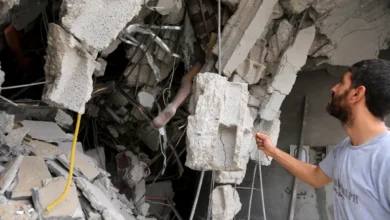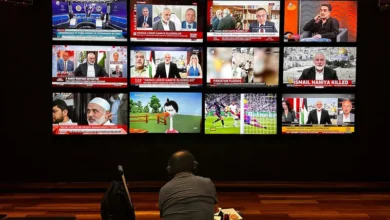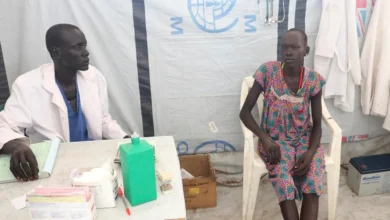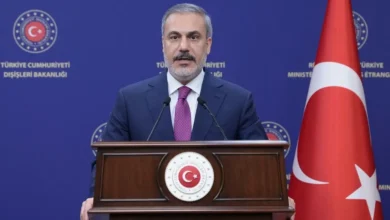UK patients escape long NHS wait lists to seek treatment in UAE: Doctors, dentists
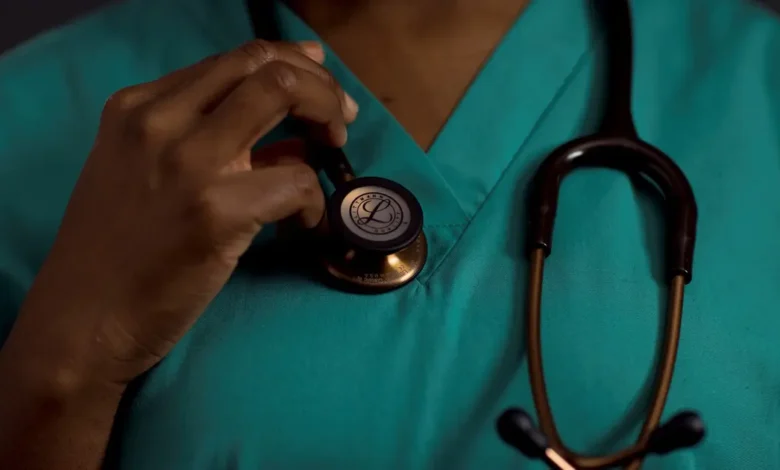
The waiting lists for routine surgeries on the UK’s National Health Service (NHS) have led to a surge in patients heading to the UAE for medical care.
A record number of people – more than 5.45 million – are currently waiting for treatment at NHS hospitals in England, according to figures released last month, with many having joined the waiting list in recent weeks.
While the UK health bodies are working more closely with general practitioners, pharmacists and other local health providers to try to reduce the number of patients requiring hospital treatment, dealing with new referrals and tackling the backlog are huge challenges.
For many, the potential two-year wait for treatment – such as a knee operation or hip replacement – is too long and they are looking to seek treatment at private facilities and turning to the Middle East where treatment is not only faster, but also cheaper than private care in the UK.
Circumventing UK delays

Dr Titty Mary Thomas, a specialist in family medicine at Bareen International Hospital, in MBZ City, Abu Dhabi who has treated patients flown into the UAE from the UK told Al Arabiya English that routine appointments in the NHS are getting delayed due to various factors, such as increased demand for services, workforce shortages, budget constraints and an aging population.
“Being a family medicine specialist providing primary care, I have often received queries from expatriate patients on whether they could bring in their parents or relatives from the UK and other countries for specialized care in the UAE and thereby avoid the delays in getting routine treatment or operations there,” she said.
“The healthcare institutions in the UAE have invested significantly in their infrastructure, offering high-quality medical facilities,” she added, explaining why the UAE is a preferred destination for many patients in the UK.
“This high-quality care and easy referral system to specialists helps family physicians like me guide patients to the right specialists,” she further said.
In the UK, healthcare is primarily provided through NHS, which offers free or subsidized treatment to residents.
Dr Deep Bhattacharya, a general physician at Dubai’s Canadian Specialist Hospital, concurred that despite the NHS having been a “beacon of universal healthcare,” providing free-at-the-point-of-use services to all UK residents, in recent years, has been grappling with increasing wait times for routine appointments and operations.
The UK, like many developed nations, is experiencing a demographic shift towards an older population. “This aging population requires more frequent and complex healthcare, leading to increased demand for NHS services,” Dr Bhattacharya said.
“Despite the increasing demand, the NHS has faced years of underfunding. This has resulted in a lack of resources to expand capacity, leading to longer wait times. In addition, the COVID-19 pandemic put an unprecedented strain on the NHS, causing a backlog of routine appointments and operations as resources were diverted to manage the crisis,” he said.
While there may be some out-of-pocket expenses or additional costs for certain treatments, the overall cost burden is relatively low for patients in the UK, Dr Thomas said. However, if patients want to circumvent the long delay by opting for treatment at private healthcare facilities, the cost for such treatment is very high.
But in the UAE, costs are often cheaper than the same treatment back in the UK, he said.
Rahul Shukla, the director of local patient services at Burjeel Holdings, also told Al Arabiya English that the hospital group has witnessed a surge in patients eligible for care under the NHS coming to the UAE for routine treatments.
“We have witnessed greater interest from patients from the UK for elective procedures that have a longer waiting time (back home),” he said. “We particularly see patients coming from the UK for orthopedic, ophthalmology and dental care. However, recently, we are also receiving enquiries for weight loss treatments and general surgeries.”
Shukla said international travelers have long identified the UAE as a wellness destination, including for health screenings, aesthetics, fertility solutions and dental care.
Apart from the NHS waiting list, there are other factors that have prompted people to seek medical care in the UAE.
Patients who sought medical care in the UAE during and after COVID-19, when the Gulf state controlled infections greatly through stringent policies and curbs, helped spotlight the UAE as a prime medical tourism destination.
“(Also) the UAE has a large network of internationally accredited hospitals, along with global healthcare talents. Its three mega cities, leisure facilities, support infrastructure, such as a range of hotels, and seamless local transport have further contributed to the ease of accessing healthcare in the UAE,” Shukla explained.
Dr Bhattacharya said that the UAE has invested heavily in its healthcare infrastructure, attracting top medical professionals from around the world. With a well-resourced healthcare system, patients in the UAE also typically experience shorter wait times for appointments and operations compared to the NHS, he further explained.
“The UAE’s expatriate-friendly environment, English-speaking medical professionals and cultural familiarity have all contributed towards making it an attractive destination for UK residents,” Dr Bhattacharya added.
Competitive pricing
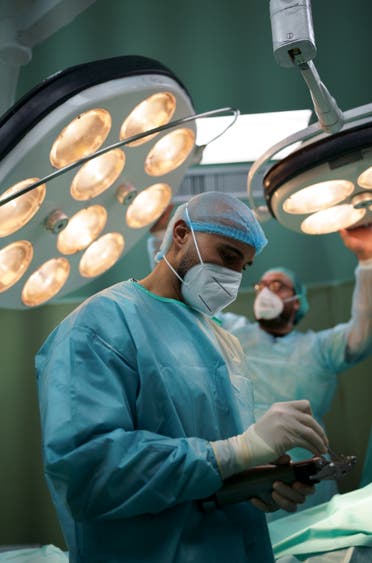
Shukla said competitive pricing in the UAE makes it an attractive destination for patients in the UK, while Dr Thomas said that medical tourism has led to economic growth in the national healthcare sector.
“To cope with increased demand, healthcare providers in the UAE are expanding their facilities by building new hospitals, clinics and medical centers. This expansion aims to accommodate both, local residents as well as medical tourists,” Dr Thomas said.
“Recruitment of skilled professionals, improving infrastructure and technology and use of telemedicine services will further help UAE to cater to international patients and residents,” she said.
The general practitioner also highlighted the role that collaborations and partnerships with international medical institutions play in allowing knowledge exchange, training opportunities and specialized treatment options.
Dr Bhattacharya said that a surge in private healthcare investment in the UAE and Saudi Arabia had led to competitive pricing for high quality services.
As a case in point, he said: “A routine surgical procedure like a hip replacement can cost around £10,000 ($12,890) in the UK for non-residents, while in the UAE, the same procedure can range from £4,000 ($5,160) to £6,000 ($7,730).”
Similarly, diagnostic procedures such as MRI scans are also less expensive in the Middle East compared to the UK, said Dr Bhattacharya, though he added that it’s important to note that these costs can vary based on several factors, including the hospital, the patient’s condition and the specifics of the treatment plan.
Surge in dentist demands
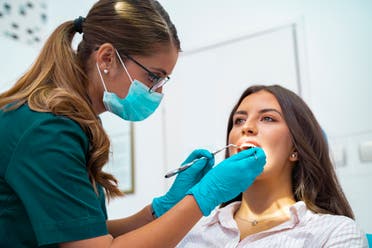
Across the UAE, dentists are also reporting a surge in patients coming for vital dentistry work.
It follows British reports earlier this month where people across the UK have had to pull their own teeth out because they could not access or afford an NHS dentist.
Extractions have been performed with pliers in some cases, while others have been forced to make a five-hour round trip to see a professional, according to the UK’s Sky News.
A YouGov poll from March 2023 that found 10 percent of respondents had attempted “DIY dentistry” – and of those, 20 percent did so because they couldn’t find an NHS dentist.
In the UAE, Shehzeen Ahmad, Managing Director at Euromed Clinic Dubai, said people in the UK have given up on waiting for free treatment and seeking affordably priced dental care abroad.
“We generally get two or three patients per month who come to Dubai expressly for dental/medical procedures,” he told Al Arabiya English.
“Although many in the UK are travelling to certain countries in Eastern Europe and Turkey for procedures, in recent months the UK media has been filled with horror stories of procedures gone wrong from these places because there is no adherence or strict regulations about patient safety in these places.”
In the UAE, however, clinics are governed by strict rules and are continuously monitored by DHA to ensure an excellent standard of practice.
“So, it is not that easy to open a clinic and even if you are able to open, maintaining the necessary level of high standards to remain open is an arduous task and requires you to be consistently at the top of your profession. Therefore, any medical tourists who do their research will understand the difference in coming to Dubai/UAE as opposed to choosing to go to other countries,” Ahmad from Euromed said.
“Indeed, Dubai is an attractive hub for medical excellence and here we are very much at the forefront of medical procedures globally. Plus, the city is easily accessible from anywhere in the world.”
“I would argue that Dubai is the ideal city, where everything is built with perfection as the fundamental target. This makes Dubai attractive to the best in each profession, medicine being one of those professions – and if the best doctors are here, then consequently, patients will follow,” he said.
Some patients come to Dubai for treatment not offered on the NHS, according to Ahmad.
“Interestingly, while the NHS is still keeping amalgam-based fillings, they do advise that mercury fillings are now marked as potentially dangerous for a person’s health and recommend using dental fillings made of cast gold, silver amalgam, and composite fillings for this purpose. That said, the Safe Mercury Amalgam Removal Technique (SMART) is a safety protocol from the International Academy of Oral Medicine and Toxicology (IAOMT) is a specialized process and one that is not offered in the UK routinely. We have had a few patients in the last few months alone who have travelled to us to have this procedure done.”
Aside from basic cleaning and dental hygiene, Ahmad has experienced many tourists coming to have aesthetic dentistry such as Digital Smile Design; a smile analysis created based on a patients’ teeth, gums, lip line, and facial references, then a custom smile design is prepared in harmony with the patients’ facial characteristics.
“This is because rather than having a generic smile crafted from a one-size-fits-all veneer type and color, our treatments utilize technology to create a bespoke smile which will look so much more natural.”
“Depending on where you live in the UK and the quality of the treatment you wish to have, costs vary. The biggest attraction with coming to Dubai is that it is renowned not only as a place of medical brilliance but also a popular holiday destination and so both elements can be combined in one trip.”

